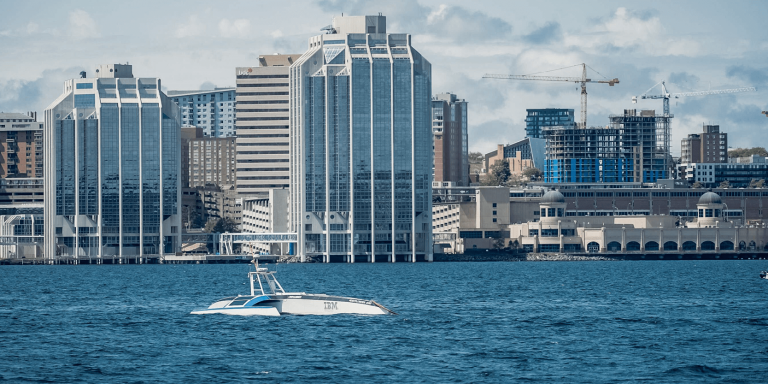
After technical stops in the Azores and Halifax, Canada, the 15-meter long oceanographic trimaran Mayflowerarrived in the port of Plymouth, Massachusetts, after an autonomous crossing of the Atlantic, it would be, according to its designers, the first boat of this size to achieve this feat. Piloted by AI and propelled by solar energy, its primary objective is oceanographic research. The 3 initial projects aimed to measure sea level and wave height, analyze the chemical composition of sea water and listen to whale songs via hydrophones.
Artificial intelligence is increasingly used in the maritime field, whether for port logistics, preservation of the marine ecosystem or autonomous navigation. However, collecting data from a system as vast and complex as the ocean is extremely expensive.
Brett Phaneuf, co-founder of ProMare, a science foundation specializing in marine research, and director of the Mayflower autonomous ship project states:
“Autonomous research vessels such as MAS – integrated with other land, ship, and satellite networks – can collect data about the ocean at a scale and cost far beyond what is possible with the current relatively small fleet of manned research vessels. This is why I became interested in the use of robotics and autonomy in ocean exploration. It opens up parts of the ocean that are simply not accessible to humans.”
At the end of 2016, ProMare presented the Mayflower Autonomous Ship (MAS) concept at a conference in Switzerland, it interested the IBM representatives in the audience.
The 5-ton, 15-meter-long autonomous ship was built in Poland to ProMare’s specifications and assembled in England. ProMare and IBM developers designed the “Captain AI”: with the help of inference algorithms and models generated from IBM Visual Insights computer vision technology, they trained it on more than one million nautical images so that it could recognize ships, bridges, land and other hazards. Additional mathematical modeling for decision support is provided by IBM CPLEX Optimizer
When “Captain IA” obtains actionable data from onboard cameras, radar, sonar and other equipment, it relies on the IBM Operational Decision Manager (ODM) management system, the devices are orchestrated by IBM Edge Application Manager, which deploys the software to the sensors positioned on board the ship. In turn, the IBM Maximo suite of applications provides intelligent asset management and maintenance.
In the open ocean, MAS’ AI captain relies on recommendations from the ODM and updates from The Weather Company, an IBM company, to continuously assess options, avoid hazards, make navigational decisions and carry out the search mission at hand.
A disrupted crossing
The crossing from Plymouth, England to Plymouth, Massachusetts, planned to commemorate the 400th anniversary of the arrival of the Pilgrims who left England for America to escape religious persecution, has been delayed. The first attempt was made in June 2021, but less than a week after departure, a power problem forced the ship to return to its home port for repairs.
The Mayflower departed on April 27 to arrive on June 30, after being diverted to the Azores and then to Halifax to resolve generator problems and battery faults.
For Brett Phaneuf, in spite of these technical problems, the project was a success since it reached its objective, the crossing of the Atlantic. The lessons learned will not only have scientific value, but will also lead to practical and sustainable advances for many organizations, such as shipping and logistics, oil and gas exploration, and security and defence-related industries.
Translated from Bateaux autonomes : le Mayflower Autonomous Ship a rejoint Plymouth dans le Massachussets









